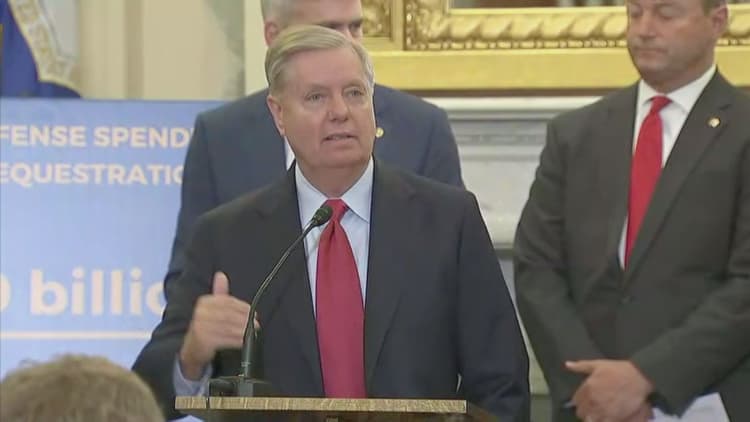
With Republicans like these, who needs a Democrat to prevent Obamacare from getting repealed?
A proposed bill to repeal and replace major parts of the Affordable Care Act sparked a Twitter tiff Friday between two GOP senators: one of them a sponsor of the legislation, the other a staunch advocate for total repeal.
The digital exchange between Sen. Rand Paul of Kentucky and Sen. Bill Cassidy of Louisiana underscores the fact that having control of the Senate does not mean that Republican leaders will win passage of the bill dubbed Graham-Cassidy.
Cassidy earlier Friday had claimed there are up to 48 or 49 GOP senators who have publicly or privately supported the bill, putting it tantalizingly close to passage.
Senate Minority Leader Chuck Schumer appeared to see another Obamacare repeal effort as a more realistic possibility on Friday. The New York Democrat tweeted that "Trumpcare is back & Senate GOP has until Sept 30 to pass their bill." He added, "We need your voices more than ever!"
Paul, whose opposition to the bill may effectively doom it to defeat, didn't let the issue go even after Cassidy stopped responding.
Republicans, who hold just 52 seats in the Senate, need 50 GOP senators to support the bill for it to pass.
While Paul had voted for an earlier Obamacare replacement bill in July, three other Republican senators, John McCain, Susan Collins and Lisa Murkowski voted against it, ensuring its failure in the Senate.
Meanwhile Friday, Senate Majority Leader Mitch McConnell, R-Ky., asked the Congressional Budget Office to quickly provide an analysis of Graham-Cassidy. A CBO "score," or projection of how much a bill will cost and affect things including the number of people insured and what they pay for coverage, is traditional for such a bill.
Because the bill is being considered through a Senate process known as reconciliation, it must be approved by Sept. 30 if it is to become law.
Also Friday, a liberal think tank published an analysis of the bill, which found it "would gut protections for people with pre-existing conditions" if it is signed into law.
The Center on Budget and Public Priorities had previously estimated, in July, that Graham-Cassidy's reduction in total federal spending on health insurance would reduce by more than $3 billion the amount of money Kentucky, Paul's state, would get through Obamacare.
Obamacare, among many other things, barred insurers from either denying coverage to people with pre-existing health conditions, or charging them higher rates than healthier people.
Both things occurred before the ACA became law, and were blamed for keeping the nation's uninsured rate higher than it would otherwise be.
The Center on Budget and Policy Priorities said Graham-Cassidy "would give states broad waiver authority to eliminate the ACA's core provisions for people with pre-existing health conditions."
The group noted those waivers would come on top of the bill's elimination of federal aid to help low- and middle-income people buy individual health plans, the elimination of expanded Medicaid benefits to poor adults, and big cuts to overall health insurance spending by the government.
CBPP senior fellow Aviva Aron-Dine wrote that a "little-noticed provision" of Graham-Cassidy that is related to block grant funding to states would allow individual states to get rid of Obamacare's pre-existing rules.
"For example, a state that used a small portion of its block grant funding to provide even tiny subsidies to all individual market plans could then waive these protections for its entire individual market," Aron-Dine wrote.
"Likewise, states that used block grant funding to offer or subsidize coverage for low-income people could offer plans with large gaps in benefits. States seeking waivers would have to explain how they 'intend' to maintain access to coverage for people with pre-existing conditions, but they wouldn't have to prove that their waivers would actually do so."
Aron-Dine noted that the waiver authority in Graham-Cassidy is similar to waivers contained in an Obamacare replacement bill passed by the House of Representatives earlier this year.
A Congressional Budget Office analysis found that states that contain one-sixth of the nation's population would let insurers charge sick people higher rates under those waivers in the House bill.
In those states, "less healthy individuals (including those with preexisting or newly acquired medical conditions) would be unable to purchase comprehensive coverage with premiums close to those under current law and might not be able to purchase coverage at all," the CBO said.
And states accounting for half of the U.S. population would let insurers exclude the Obamacare requirement that their health plans cover a minimum set of so-called essential health benefits, the CBO found.
People needing, "maternity care, mental health and substance abuse benefits, rehabilitative and habilitative services, and pediatric dental benefits" in those states "would face increases in their out-of-pocket costs," according to the analysis.
"Some people would have increases of thousands of dollars in a year," the CBO said.
WATCH: Sen. Warner says Dems should have worked with GOP on Obamacare



